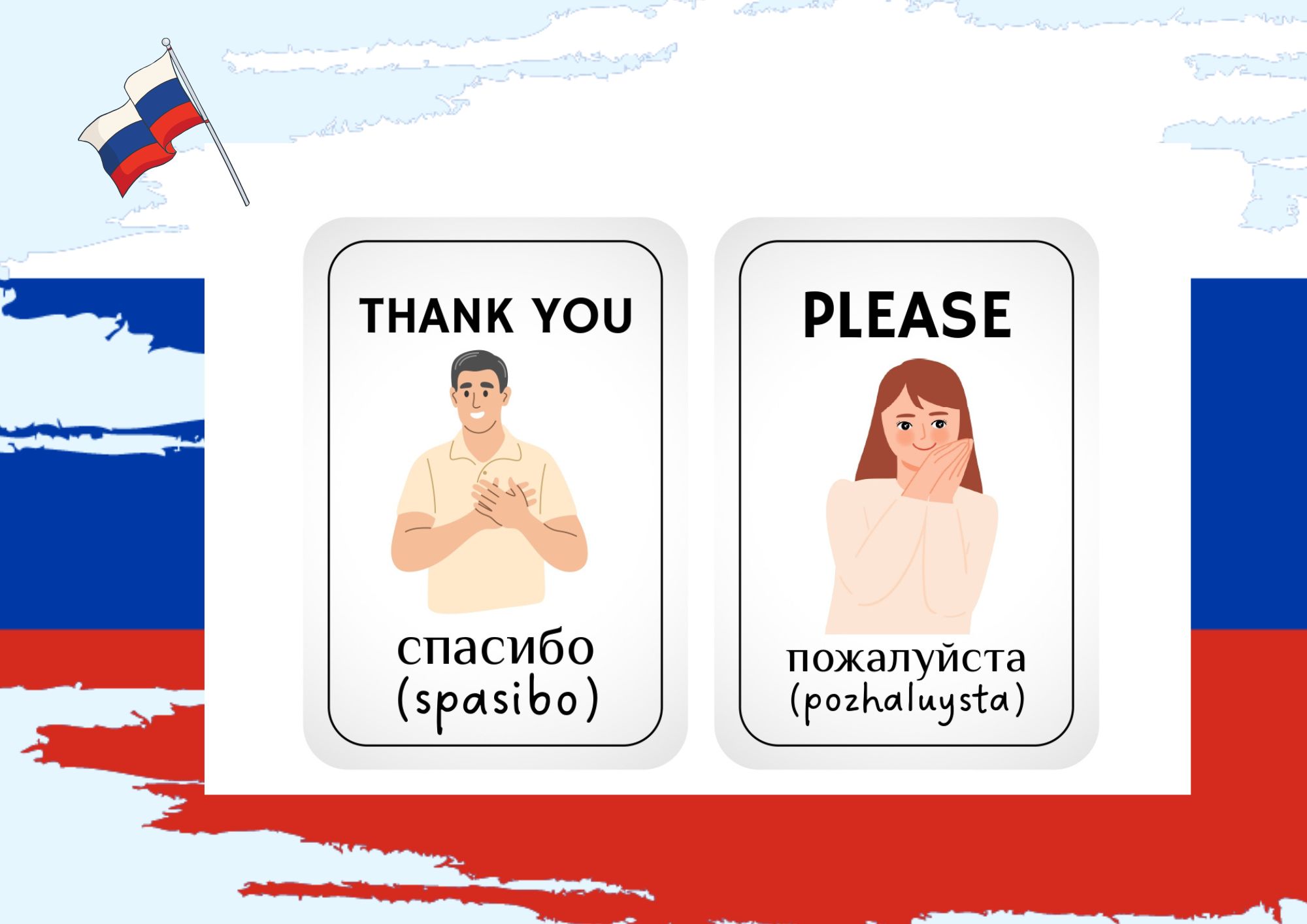Your six-year-old comes home from school talking about the new kid who speaks Russian. They want to say hello but don’t know how. Or maybe you’re walking through the international section of the grocery store and your child points at the Cyrillic letters asking what they mean. Kids notice languages everywhere, and Russian catches their attention because it looks like a secret code.
These Russian Vocabulary Flashcards turn those mysterious-looking letters into words kids can actually use. Forty basic Russian words that pop up in real life, from saying hello to counting cookies. No overwhelming grammar lessons or confusing explanations. Just simple words with easy pronunciation guides that make Russian feel approachable and exciting.
Russian puzzles most adults because those letters look completely foreign. But kids see them as puzzle pieces to figure out. When they discover that “мама” sounds like “mama” and means the same thing, Russian becomes less mysterious and more like a fun game to play.
These cards stick to words children hear and use daily. Basic greetings, family words, things around the house, numbers for counting. Real vocabulary that lets kids connect with Russian speakers and feel proud when they recognize words in movies or books.
Images

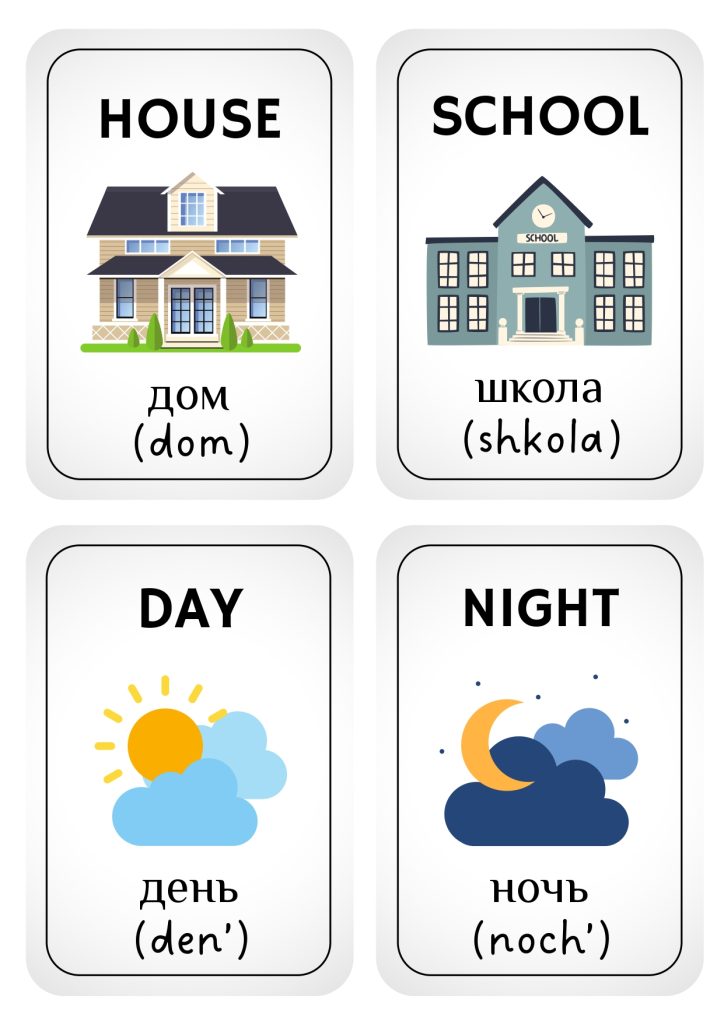
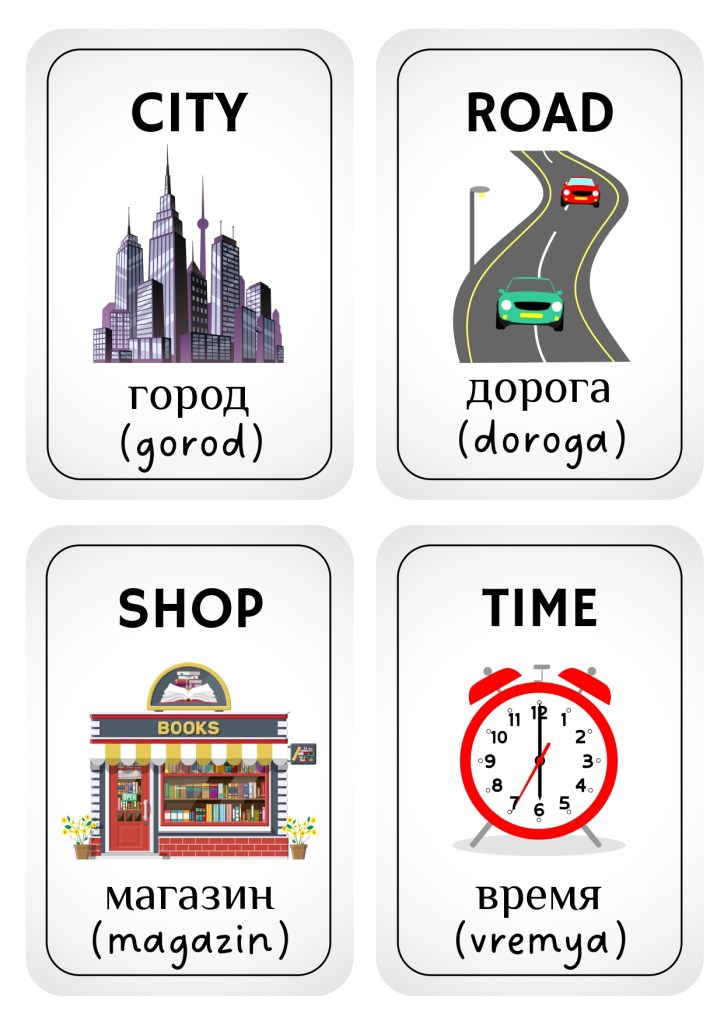
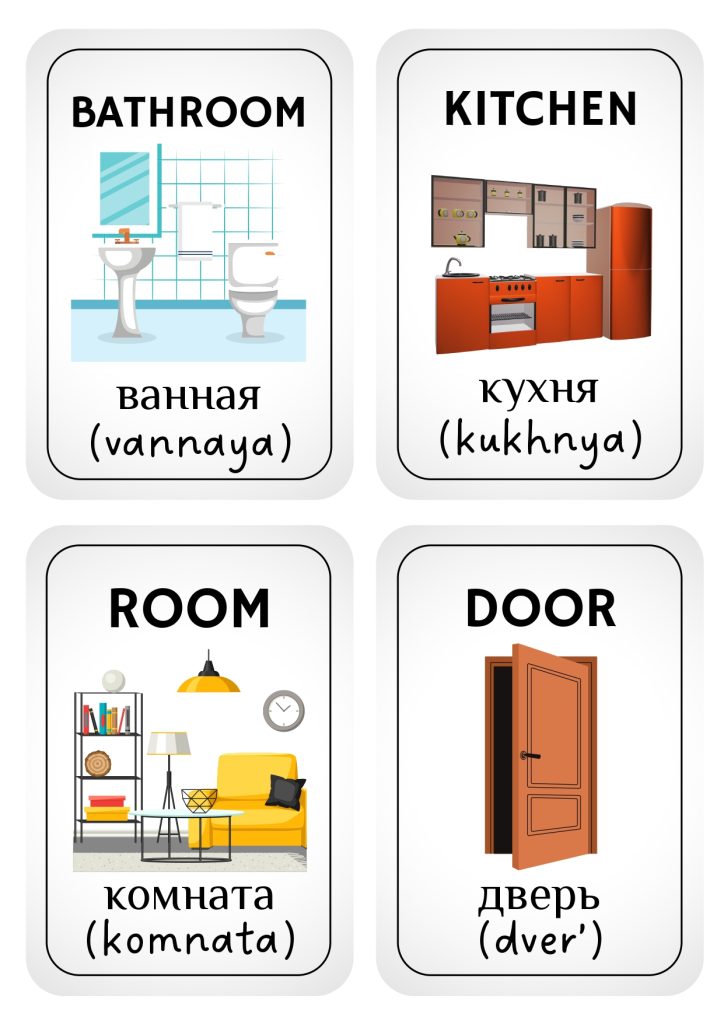
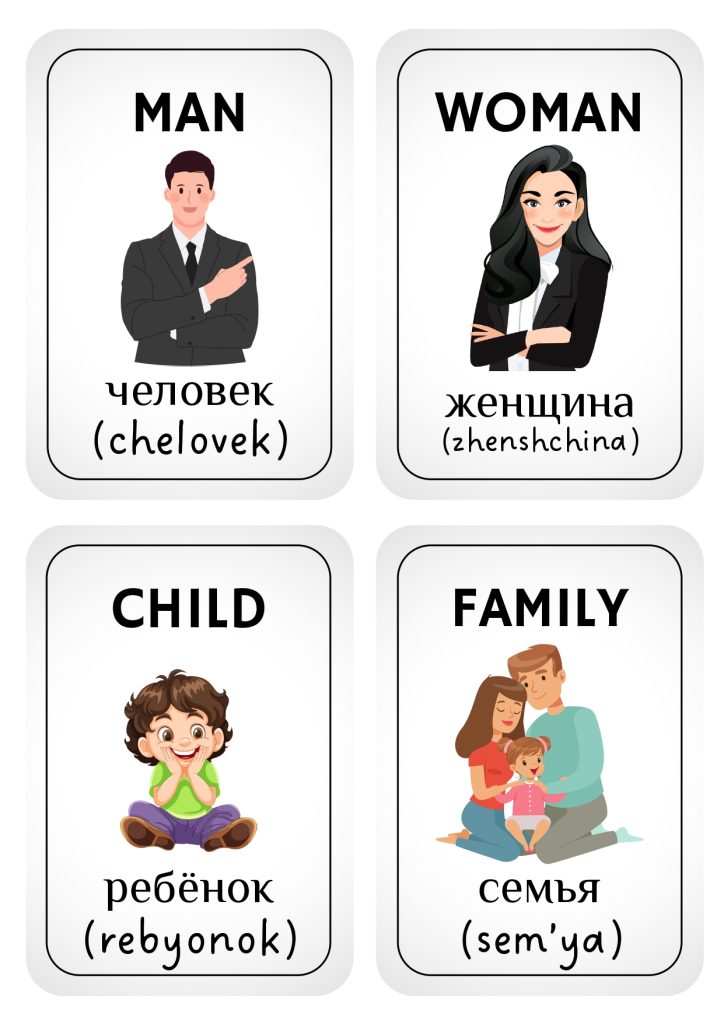
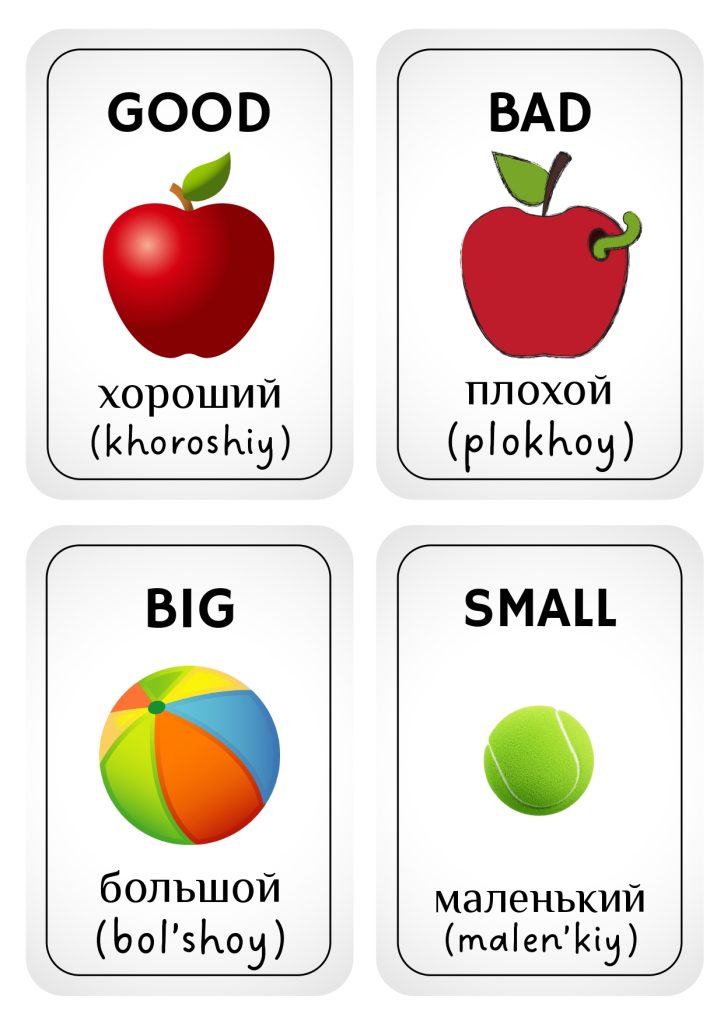
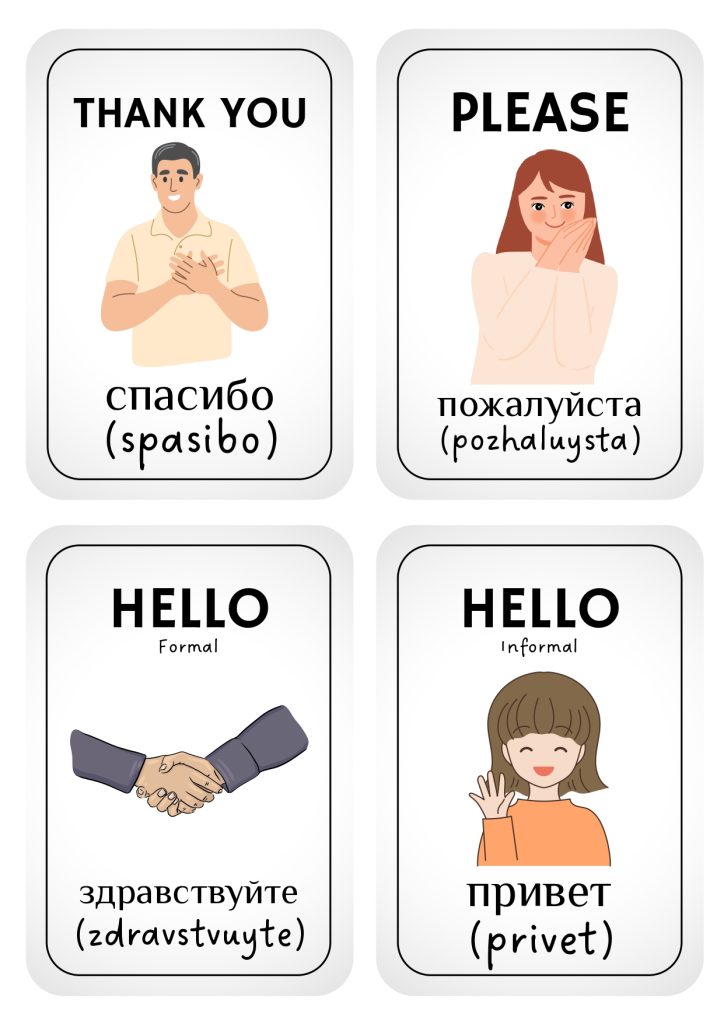
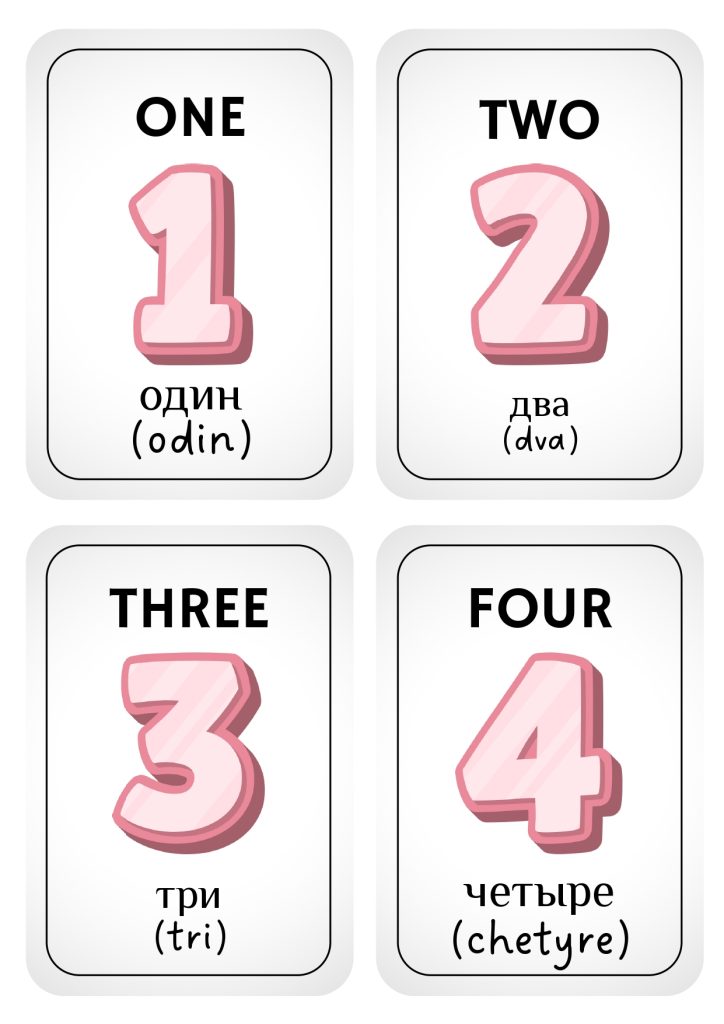

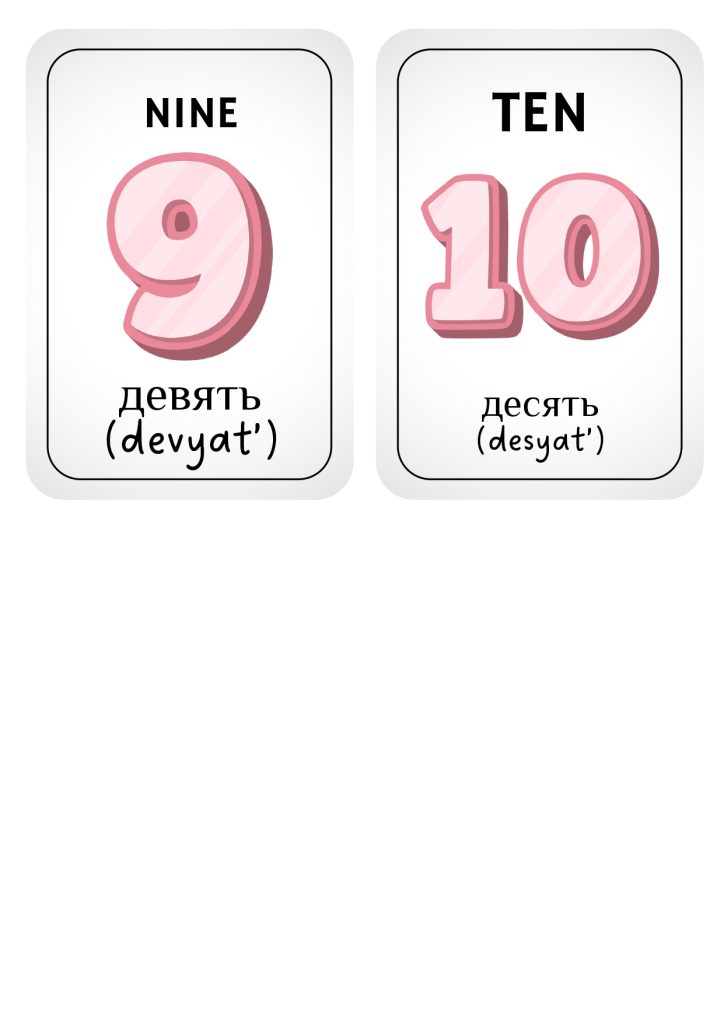
Download It Here!
Words That Actually Matter
These forty Russian words show up everywhere in kids’ lives. Each word connects to something they already know, so new vocabulary sticks without forcing it.
1. Food and Drinks
- еда (eda) – Food is universal. Kids get excited when they can name their lunch in Russian.
- вода (voda) – Water sounds close enough to “vodka” that kids remember it easily (though obviously different meanings).
- чай (chay) – Tea becomes special when kids can order it in Russian at restaurants.
- кофе (kofe) – Coffee sounds almost identical in both languages, making it a confidence booster.
2. Places and Time
- дом (dom) – House connects to the place they feel safest.
- школа (shkola) – School transforms from just a building into a Russian adventure.
- день (den’) – Day connects to “What did you do today?” conversations.
- ночь (noch’) – Night links to bedtime stories and tucking in.
3. Getting Around
- магазин (magazin) – Shop sounds familiar enough that kids pick it up fast.
- город (gorod) – City opens conversations about different places they visit.
- дорога (doroga) – Road helps them talk about car trips and walks.
- время (vremya) – Time becomes useful for “What time is it?” games.
4. Around the House
- комната (komnata) – Room helps them describe their personal space.
- ванная (vannaya) – Bathroom is essential vocabulary for any kid learning a new language.
- кухня (kukhnya) – Kitchen connects to cooking, eating, and family time.
- дверь (dver’) – Door becomes the entrance to practicing new words.
5. People in Our Lives
- человек (chelovek) – Person helps kids identify everyone they meet.
- женщина (zhenshchina) – Woman connects to moms, teachers, and aunts.
- ребёнок (rebyonok) – Child helps them identify with Russian-speaking kids.
- семья (sem’ya) – Family links to the people they love most.
6. Describing Everything
- хороший (khoroshiy) – Good gives kids a way to say they like something.
- плохой (plokhoy) – Bad helps when something goes wrong or they don’t like it.
- большой (bol’shoy) – Big describes elephants, buildings, and older siblings.
- маленький (malen’kiy) – Small fits puppies, babies, and lost toys.
7. Being Polite
- спасибо (spasibo) – Thank you for building good manners in any language.
- пожалуйста (pozhaluysta) – Please show respect and get better results.
- здравствуйте (zdravstvuyte) – Formal hello for meeting adults and teachers.
- привет (privet) – Casual hello for friends and family.
8. Counting Fun
- один (odin) – One for pointing out single items.
- два (dva) – Two for pairs like shoes and hands.
- три (tri) – Three for tricycles and triangles.
- четыре (chetyre) – Four for table legs and wheels on cars.
- пять (pyat’) – Five for fingers on one hand.
- шесть (shest’) – Six for legs on insects.
- семь (sem’) – Seven for days in a week.
- восемь (vosem’) – Eight for spider legs.
- девять (devyat’) – Nine for baseball innings.
- десять (desyat’) – Ten for all fingers together.
Flashcards Games That Work
- Russian Scavenger Hunt: Hide cards around the house and give clues in English. “Find something you eat” leads to food еда (eda). “Find where you sleep” leads to room комната (komnata). Kids love hunting for things and remember words better when they move around looking for them.
- Build a Russian Town: Kids arrange cards to create an imaginary Russian town. They put school школа (shkola) next to house дом (dom), add shop магазин (magazin) down the street, and connect everything with road дорога (doroga). This helps them understand how words relate to each other.
- Number Hopscotch: Draw squares on the sidewalk and write Russian numbers one through ten один through десять (odin through desyat’) in each box. Kids hop through while saying the numbers. Add challenges like hopping backwards or skipping certain numbers.
- Russian Kitchen: Set up a pretend kitchen with food cards. Kids take turns being chef and customer, ordering food еда (eda), water вода (voda), and tea чай (chay). This makes vocabulary practical and builds confidence for real situations.
- Mix and Match Stories: Kids grab three random cards and make up stories using those Russian words. They might tell about a small маленький (malen’kiy) child ребёнок (rebyonok) who lives in a big большой (bol’shoy) house дом (dom). This gets creative juices flowing while practicing vocabulary.
- Beat the Clock: Set a timer for 30 seconds. Kids race to match Russian words with English translations. Start with five cards and add more as they get faster. Competition makes learning exciting without pressure.
Pronunciation Made Simple
Russian pronunciation challenges adults, but kids pick up sounds naturally through repetition. These cards include easy pronunciation guides using English sounds kids already know.
The phonetic hints like (eda), (voda), and (chay) give kids starting points. Perfect pronunciation comes later – confidence comes first. When kids feel comfortable trying Russian words, their pronunciation improves on its own.
Make pronunciation fun instead of stressful. Kids can whisper Russian words like secret agents or shout them like sports announcers. These silly approaches help them practice without worrying about mistakes.
Connecting Languages
Kids learning Russian alongside other languages notice fascinating connections. Children who master Spanish greetings with our Spanish Flashcards often find Russian greetings easier to tackle because both languages emphasize formal and informal address.
Learning one foreign language builds skills that transfer to others, creating language confidence that lasts their whole lives.
Similarly, kids working with our French Flashcards discover that Russian family vocabulary shares emotional importance with French family terms.
This cross-language awareness helps children understand that all languages express universal human experiences through different sounds and letters.
Making Russian Vocabulary Stick
- Morning Russian Replace a few English words with Russian during breakfast. Say “доброе утро” instead of “good morning.” Ask for вода (water) with cereal. Small changes make Russian feel normal instead of foreign.
- Bedtime Numbers Count from один to десять (one to ten) in Russian before sleep. Kids love the rhythm of Russian numbers, and repetition before bed helps memory. This calm practice connects Russian with comfort.
- Store Trips Bring relevant cards to the grocery store and identify items in Russian. Point out bread, milk, and other foods. Real-world practice makes vocabulary meaningful and memorable.
- Dinner Table Russian Use Russian words for please, thank you, and basic requests during meals. This natural practice builds polite conversation skills while reinforcing vocabulary through daily use.
Why Russian Vocabulary Flashcards Matter
Learning Russian vocabulary opens windows to understanding a fascinating culture. Kids who learn basic Russian words often get curious about Russian fairy tales, music, and traditions. This curiosity grows into real appreciation for different cultures.
Russian vocabulary also builds brain connections that help with all learning. Children who tackle Cyrillic letters and Russian sounds develop mental flexibility that helps with math, reading, and problem-solving.
These forty cards create a foundation for lifelong Russian learning. Kids who master basic vocabulary often continue studying Russian formally, leading to advanced language skills and cultural understanding.
Getting Started
These Russian Vocabulary Flashcards turn mysterious letters into familiar words. Forty essential terms that connect to daily life, paired with simple pronunciation guides and fun learning activities.
Easy Printing: Open the PDF and hit print. Use regular A4 paper with portrait orientation. Choose “fit to page” for proper size. Color printing makes learning more engaging, but black and white works fine too.
For cards that survive sticky fingers and spilled juice, use thicker paper or cardstock. Laminating makes them practically indestructible. Cut along the edges and you’re ready for Russian adventures.
Russian vocabulary becomes approachable when kids can connect new words to things they already know. These cards make that connection clear, immediate, and fun.

